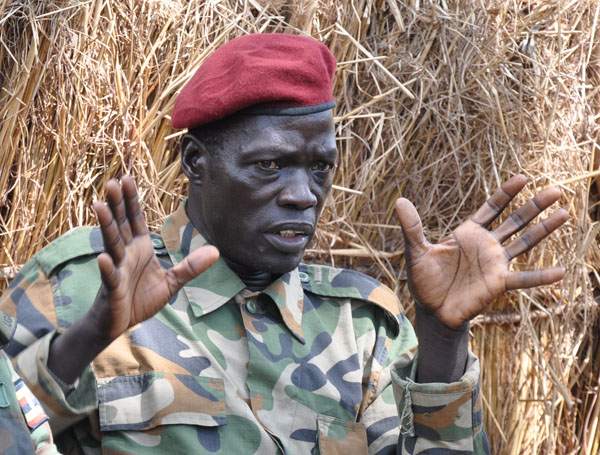
KAMPALA, Uganda — The capture of Caesar Acellam, a high-ranking LRA commander, is a significant development in the effort to bring an end to the rebel group. His survival and safe capture should serve as a model for future encounters with LRA leaders and can be a real game changer provided that the U.S., Uganda, and other partners utilize this opportunity fully.
Acellam is thought to be in his 50s and joined the LRA voluntarily in 1988. He has served as the main intelligence chief for the LRA, speaks Arabic, and was known to have close relations with the Sudanese government, which previously supported the LRA. Last known to be a major general acting as field commander for the LRA, Acellam has crucial information about the latest LRA strategy and their military and moral strength, including how the group continues to resupply arms. He could also know where Kony’s group is and whether Khartoum has resumed its support for the LRA.
Officers from the Ugandan army told the Enough Project that they have been tracking the Acellam group of 30 rebels for four weeks, along the Mbomou River that marks the border between the Democratic Republic of Congo and the Central African Republic.
Some of the Ugandan soldiers were hiding in ambush at strategic crossings for two weeks; Acellam fell into one of these as he entered the Central African Republic. The actual location of the ambush remains unknown. A Ugandan soldier told Enough that, when captured, Acellam was not wearing a military uniform but was dressed in simple clothes, disguised as one of the cattle herders who moves through the jungle regularly.
Acellam crossed the river with his “wife,” their 3-year-old child, and a maid. Four other rebels accompanied the group, but they managed to escape to the other side of the river during the brief fire exchange that broke out. The LRA often move in small groups when they track through risky areas and then regroup later.
Felix Kulayigye, the Ugandan army’s spokesperson, said the rebels “fired first.”
A U.S. diplomat told Enough that the U.S. military was not directly involved in Acellam’s apprehension. “This is really a testimony to the persistence of the Ugandan soldiers. The capture was led and driven by the UPDF who were able to track him down,” the U.S. official said.
When asked about the long-term effects of the capture, the diplomat called the capture “a very significant development.”
“Acellam is likely to be the most important senior commander to be captured alive ever. But we still have to see what kind of information he can provide and analyze that information,” the source said.
The U.S., working with the Ugandan government and other partners, should take three swift steps to increase the immediate impact of the capture and to ensure that high-ranking and lower-ranking LRA fighters follow in the footsteps of Acellam.
1 – Ensure that Acellam is granted amnesty
Acellam must be granted amnesty and his amnesty card should be issued. Unlike the LRA’s top three commanders—Joseph Kony, Okot Odhiambo, and Dominic Ongwen—Acellam is not wanted by the International Criminal Court. Granting him amnesty would send a strong signal to other commanders and fighters that they can safely leave the group.
2 – Put Acellam on the radio to communicate directly to LRA fighters in the bush
Acellam should be convinced to go on the radio to tell other LRA rebels about the fact that the Ugandan army has treated him well. Acellam told Ugandan NTV after his apprehension, “I feel okay. There is no fear. I know the UPDF didn’t do any harm during the encounter, and here [at the military barracks] they are okay.”
3 – Obtain and share intelligence to apprehend the LRA and protect civilians
Acellam could prove to be a treasure trove of information about the LRA, and if it is true that he was attempting to surrender when he was apprehended, he may be very willing to talk. The UPDF should share the intelligence provided by Acellam with the other armies that are fighting the LRA. This would help build a common front against the LRA and provide the cross-border intelligence and military cooperation, which is crucial to ending the LRA.
The capture of Acellam is truly a significant development, but the national armies and the international community must not lose sight of the main objective, which is the complete disbanding of the LRA, where Kony and the other commanders wanted by the ICC are brought to justice.
Acellam and other top commanders have long been able to avoid military pressure by crossing international borders. The troops pursuing Kony must be given full access to conduct cross-border operations to close this gap. A particular impediment, the Democratic Republic of Congo is currently off limits for the Ugandan army. The solution to this situation requires the direct involvement of the Obama administration to pressure Kinshasa to allow the Ugandan army and military advisors into the LRA-affected areas in Congo.
Photo: Caesar Acellam (Credit / Risdel Kasasira)

